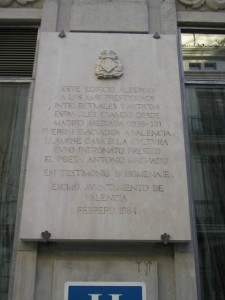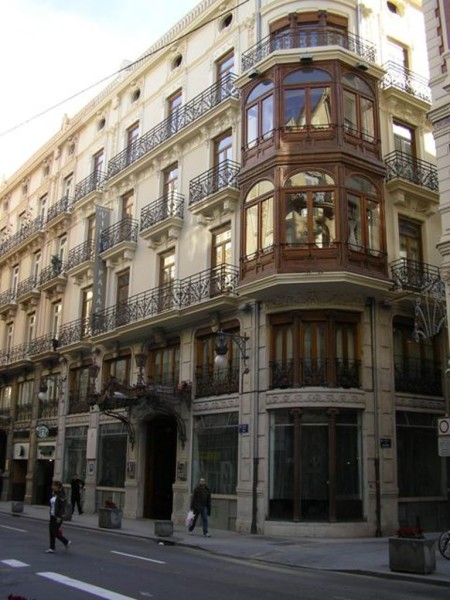Many of Valencia’s buildings have a story to tell; like a husband coming home with lipstick on his collar.
During the Spanish Civil War, the Republican intellectuals lived on Peace Street (Calle Paz), which is I suppose comforting when Franco’s bombs are falling all around you, courtesy of the Luftwaffe.
Today, the building that they occupied, and where they organised their cultural activities, led by the famous poet Antonio Machado, has been converted into a four star hotel, largely respecting the original façade and interior structure.
Black is black on the inside, where the hotel chain’s own decorating team have striven to give a touch of elegance to walls, floors and ceilings by playing with that colour.
The house is still owned by the Count of Trenor, from an important Valencian family whose title dates back to the 19th century, and it was a difference of opinion between the two sons who inherited the building that led to only half of it being finally rented out and transformed into the hotel.
It was a hotel from 1906 until the war, when it became the ‘Casa de Cultura’ during Valencia’s brief period as capital of Spain when the government had to be evacuated there from Madrid on 6th November 1936 as Franco’s forces approached.
In November 1937 the government moved north to Barcelona, but for that year the building that is now the Palace Hotel again was the cultural centre of Spain and a reference point for left-wing intellectuals all over Europe and the world.
After the war, control of the house passed back from the anarchist trade union CNT into the hands of the Trenor family again. The family’s coat of arms can still be seen, at their insistence, on stained glass windows at the top of the original stairwell.
The black furnishings and draping curtains certainly add a touch of elegance to the corridors and reception area, as they do to the rooms, which have a number of unusual attractions. One of these is the fact that the wall between bedroom and bathroom is transparent, allowing a proud husband, should he wish, to watch his delightful wife, or secretary, in the shower without having to peek around the shower curtain. Such knee-trembling pleasure is certainly worth paying a little extra for.
The hotel also offers a pillow menu for those who feel the harsh peas through the fabric, including latex, feather, hard and anatomical.
Getting back to the bathroom, as one does, there is surely no better sight to greet your sleep-shuttered eyes after a night out on Valencia’s excellent tiles, than the bathroom lamps; the only name that comes to mind to describe them is that of a sputnik undergoing an explosion in deep space.
There are also four different light settings, probably to acompany the four moods of man as described by Aristotle: sanguine, choleric, melancholic and phlegmatic
Antonio Machado may or may not have felt at home in this modern hotel; his Spain was one divided by politics and religion. In fact he invented the phrase “the two Spains”, which is still widely heard today.
For Machado, the two Spains were: “one that dies and one that yawns”. Among those that yawn he would probably have included the Count of Trenor, in whose home he and his associates squatted during the war. Fortunately, that is all history now and they no longer ask to see your party card so that you may rest your weary head and yawn yourself to sleep on one of their extremely (but not extremist) comfortable pillows.
The Vincci Palace is in C/ La Paz 42
See also our article on Ernest Hemingway, who stayed at this hotel:

